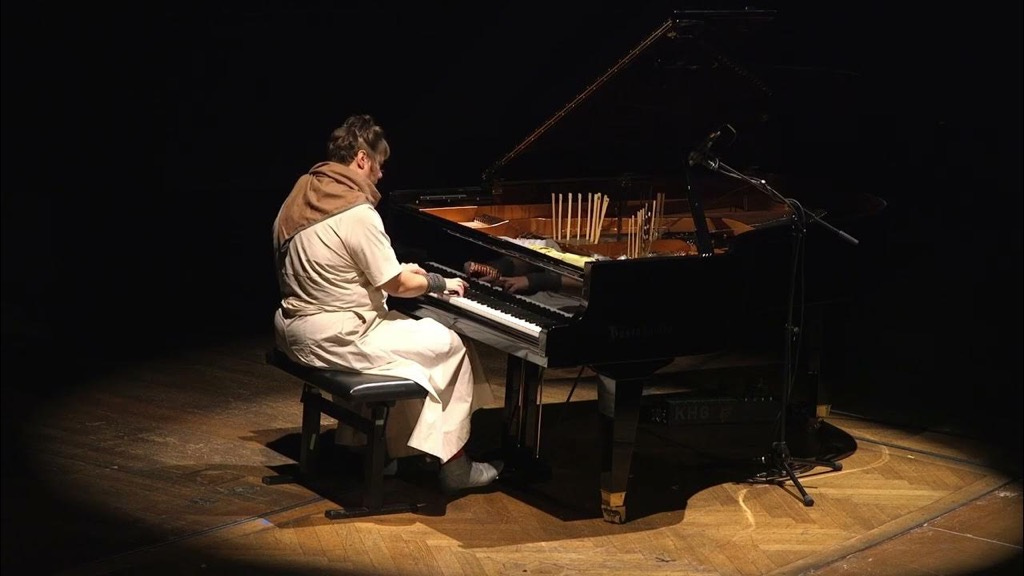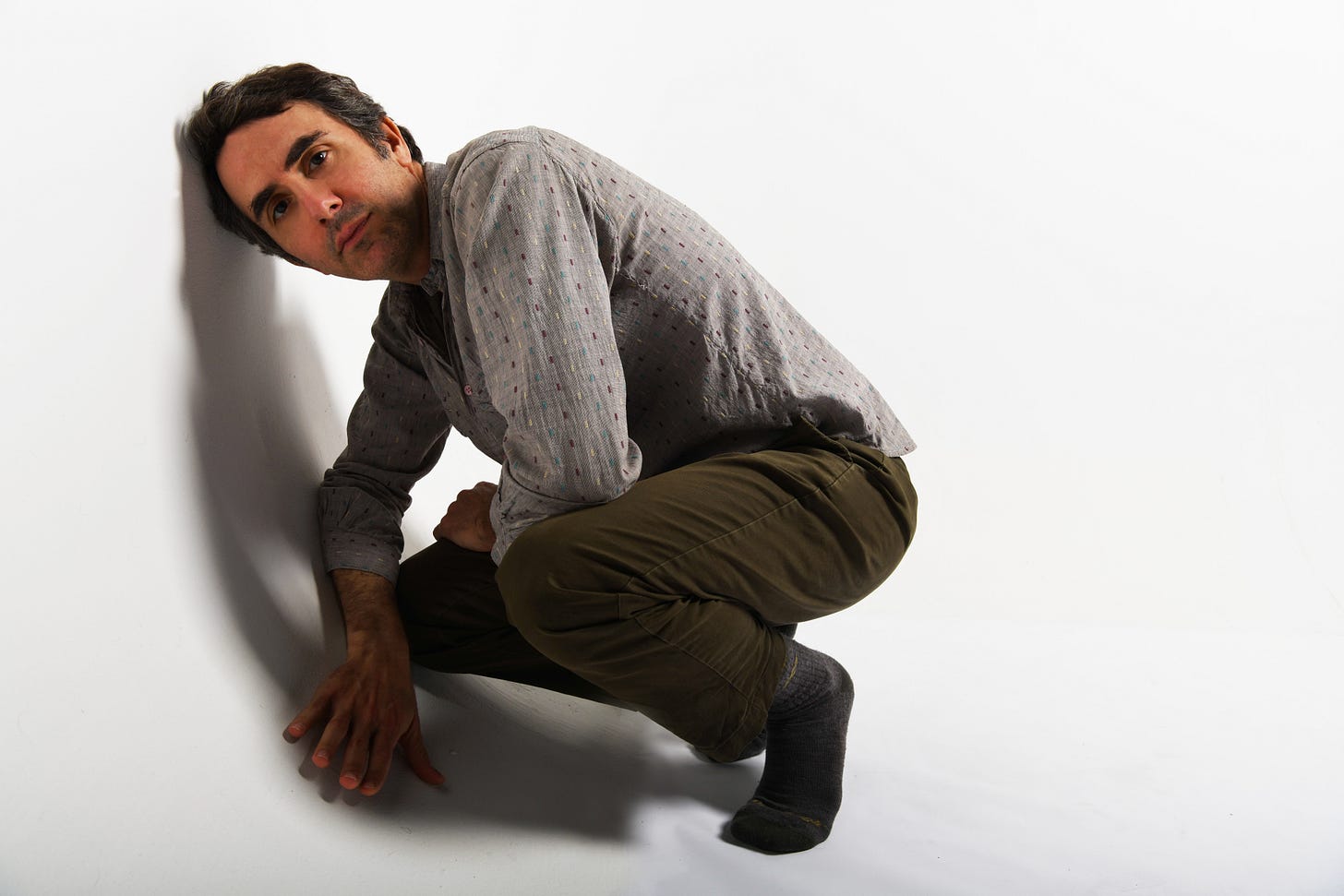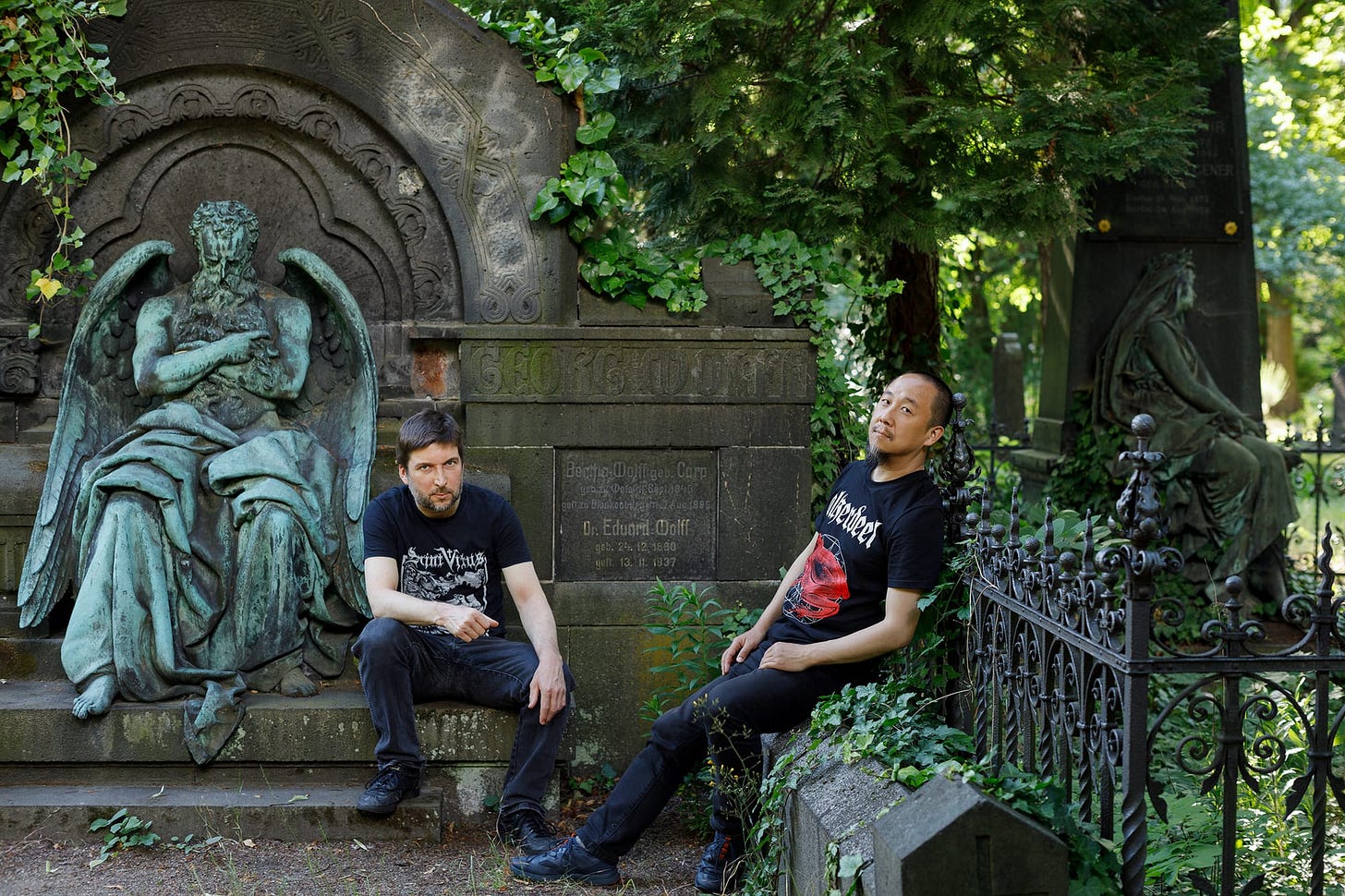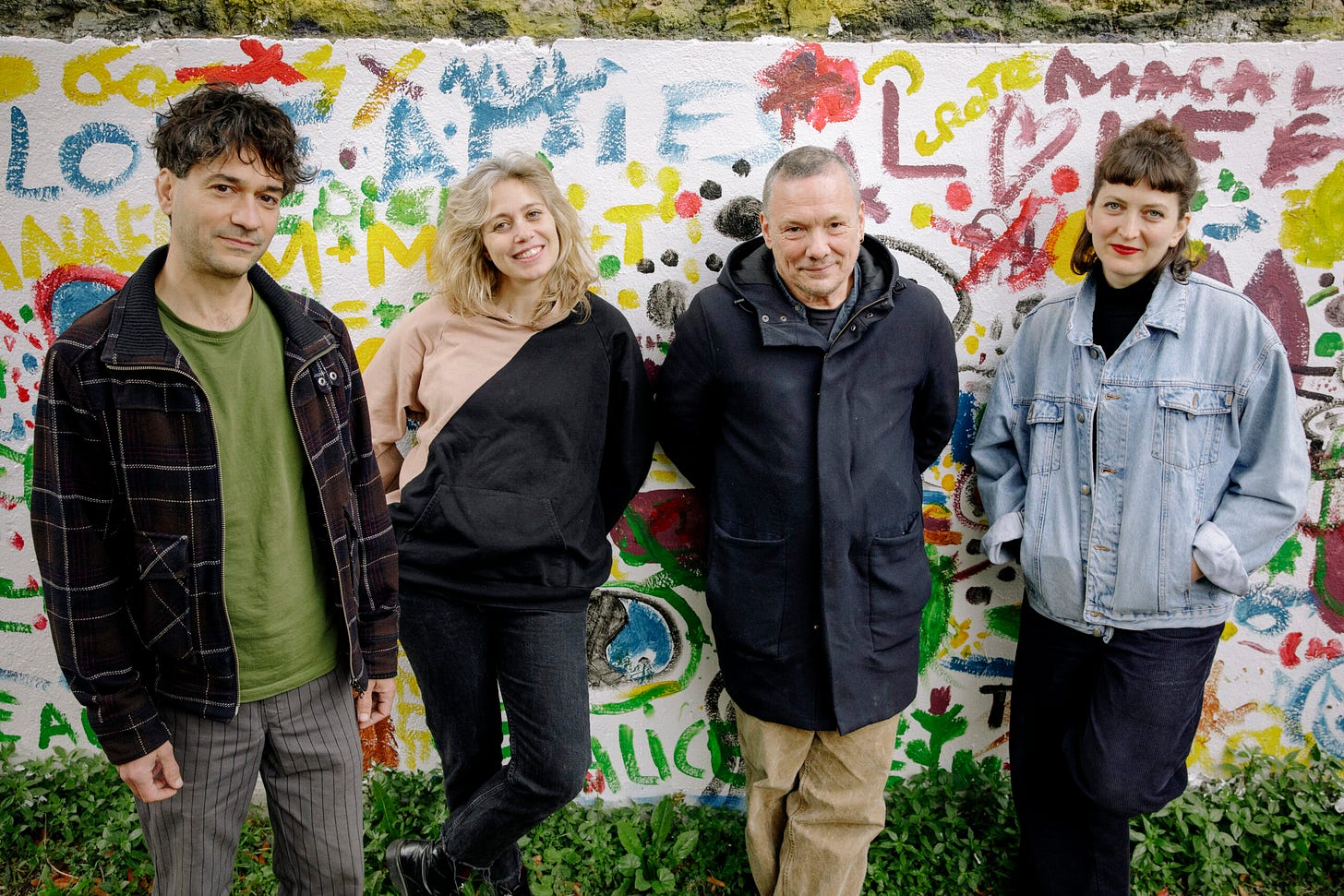The Wheels Begin to Slow Down
GRIFF & Ingrid Schmoliner, Chris Cohen, Yan Jun & Sven-Åke Johansson, Brique
As usual, the relentless pace of the Berlin music scene is starting to slow down for the holiday season. I’ll give thanks for that. I don’t mean to seem ungrateful for the bounty of offerings that have been melting my brain for the last few months, but who can’t use a break.
Ingrid Schmoliner Shakes the Earth, in the Trio GRIFF and on Her Own
On Sunday, December 8 the distinctive improvising trio known as GRIFF will wrap up a residency in Berlin with a performance at the Exploratorium. The trio, which is comprised of Berliners Adam Pultz Melbye (double bass) and Emilio Gordoa (vibraphone and percussion) and Viennese pianist Ingrid Schmoliner, released its eponymous debut on Inexhaustible Editions a few years ago, and I’ve been newly captivated by revisiting the recording. As it begins the music, recorded back in 2019, proceeds at a glacial pace, its elegantly lumbering cadences opening up rippling, slowly decaying resonances emitted by dense unison gestures. Melbye’s viscous, lower register pizzicato strikes project a funereal sobriety, each note attacking the listener like a gut-punch. Atop these pitches Gordoa traces his own note clusters and Schmoliner hammers out stern prepared piano chords. On the first piece “but still” this loosely synchronized method slowly expands, with each musician gradually adding extra information, splintering chords into component pitches and shadowing the main articulation with a sympathetic harmony through staggered, shadowing gestures. Across all four pieces the trio expertly places its reduced motifs in shifting arrays, somehow bringing an almost gagaku-like elegance to the performances, especially on “from real,” where Gordoa moves from vibraphone to stripped-down percussion voiced in the most judicious, strangely dramatic fashion. In the same piece Melbye also introduces some variation, alternating pizz with thick arco slabs of serious heft and impressive decay. You can hear it below.
But my favorite stuff happens when Schmoliner plays cycling prepared piano lines, as on “bell skin,” forging a rapidly spinning yet almost static foundation. To be sure, the pianist is perpetually altering the patterns she unleashes, but her output doubles as a kind of sonic platform that encourages and enhances more improvisatory and extroverted machinations from Gordoa’s shimmering vibraphone and Melbye’s heady bowed lines. But the time we reach the final piece, “moss rock,” Schmoliner’s relentless churn has replaced the molasses pace from the beginning of the album with a seductive freneticism, forcing the listener to parse how the various ingredients collide, generate harmonic effects, and pulsate individually and collectively. The album definitely requires some effort on the part of the listener to fully appreciate its depth, but I’m convinced that it’s an excellent investment. I can’t say for sure how the music the trio will play this weekend compares, but I do know electronics have increasingly entered the fold, especially in Melbye’s practice. I’m gung ho to discover how it’s progressed over the last five years.
Hearing GRIFF has led me down a rabbit hole, digging further into other work by Schmoliner, including impressive duo collaborations with Hamid Drake, Elena Kakaliagou, and Alexander Kranabetter, but nothing has hit me as hard as her recent solo release MNEEM (Ventil). This single 62-minute work was actually recorded back in 2019 at the Wien Modern Festival, but it sounds as fresh and electrifying as anything I’ve heard all year. Using various piano preparations, she unleashes a work of pulsing minimalism that reminds of early Philip Glass in the way it projects non-stop motion and development, but the alterations are frequently easy to miss, often noticed only after the the pianist has moved onto the next sequence. Yet the ferocious energy and physical heft of Schmoliner’s playing is a radical departure from that Glass material, and the way she rejiggers and changes the phrases she unleashes has little connection to the general consistency of Glass’s shapes. Her two hands are in constant motion, pounding out a shifting terrain of terse yet intricate patterns that proceed as if batons passed in a relay race. From photographs I’ve seen that Schmoliner uses wooden dowels to mute certain piano strings, and rattle others. The toggling phrases seem to expand and contract, providing an illusory sensation of four or five lines overlapping simultaneously. People often remark on how the piano is a percussion instrument, but I’ve rarely experienced a musician illustrating that conception with such force and imagination. I’m still utterly perplexed by a kind of percussive element that enters the fray around the 22:30 mark, building from an almost random-seeming gesture that grows more prevalent and complex as the piece unfolds. At first I thought some object placed in the piano was simply bouncing around after being triggered by one of the instrument’s hammers, but sometimes if feels too elegantly proportioned to be haphazard. Either way, it imparts yet another gripping element into the action. The performance was recorded with six carefully placed microphones, which help articulate the complexity and physicality of Schmoliner’s athletic delivery. You can hear the entire work in all of its astonishing power below.
Chris Cohen’s Uneasy Listening Pop
I first encountered Los Angeles singer-songwriter Chris Cohen more than a decade ago when he was playing second fiddle to guitarist John Dieterich in Deerhoof. He left the band in 2006—replaced by the wizardly Ed Rodriguez, who has retained that role ever since. Cohen turned his attention to his long-running but largely unknown solo project the Curtains (which had included Deerfhoof drummer Greg Saunier and future Julia Holter sideman Corey Fogel for several years), and with the help of singer Nedelle Torrisi he seriously developed his sense of pop craftsmanship. Reflecting on the pivot away from more outre excursions, he formed a new trio with the singer called Cryptacize, which released a pair of excellent albums for Asthmatic Kitty, colliding his elegant, hook pop aesthetic with the kind of sideways accents and deliberate vandalism that made the instability of Deerhoof’s post-Beefheart grind so appealing, although his experimental impulses were far more restrained. The band’s final record dropped in 2009 and it was another three years before Cohen released more music, making his solo debut in 2012 with Overgrown Path (Captured Tracks). I’ve dug just about everything I’ve heard by Cohen over the years, but his solo records have reduced angular structures and the noisy undertones, veering toward a more direct, easygoing pop sound bordering on somnambulant. I do mean that as a compliment.
While I do miss the current of tension that distinguished those Curtains and Cyrptacize records, I also adore the intimacy and gentleness of the solo work. Earlier this year he made his first new album in five years with Paint a Room (Hardly Art), which maintains the lowkey charm while enfolding some surprisingly sophisticated arrangements, especially on opening tune “Damage,” which features an arrangement by guitarist Jeff Parker. There is a kind of lo-fi Steely Dan vibe haunting the periphery of the music (“Night or Day “ could be a demo for Can’t Buy a Thrill), although Cohen’s lyrics and singing couldn’t be any less arch and cynical than what Donald Fagen was putting down. Instead there’s an empathetic tenderness to the lyrics that matches the melodic grace and harmonic generosity, whether lending encouragement to a struggling transgender child in “Sunever” or observing the cruel tendency of humans to find someone weaker to exert power over. Check it out below. Cohen’s voice never sounds forceful or strident, occasionally recalling cooing singers like Jeb Loy Nichols or even Michael Franks. There are still flourishes that complicate the sonic softness, particularly some of the flute and saxophone arrangements contributed by former Chicagoan Josh Johnson, a longtime sideman with Parker, the wobbly slide guitar solo that roils “Dog’s Face.” Cohen is touring with a quartet featuring keyboardist Brendan Glasson, bassist Mayya Feygina, and drummer Daniel Pearce. They play Monarch on Saturday, December 7.
The Return of Yan Jun
The utterly peculiar and uncategorizable Chinese experimentalist Yan Jun has been back in Berlin this past week, including his own little festival at Galiläakirche Berlin last night featuring a slate of performances of which he was the focal point. We have another chance to catch his antics in two different contexts on Wednesday, December 4 at the private studio of the great Sven-Åke Johansson (Fichtestr. 3, 10967 Berlin 3 HH 2. Stock), where the label Ni Vu Ni Connu will celebrate the release of two recordings with the madcap vocalist. (Those interested in attending are requested to RSVP at least a day in advance of the performance to production@grandprixdamour.com). The first of those efforts is an album called Tea Time with Johannson on percussion and Nicholas Bussmann on robot-controlled piano. It’s a weird one, of course, with Yan Jun caterwauling in some unknown tongue, howling, moaning, blubbering, and shouting over decidedly sparse, direction-changing accompaniment. The album includes a liner note essay by Sun Zhizheng who struggles to explain what’s going on here, just as I struggle to understand what I’m hearing. “I know nothing about Åke Johansson or Nicholas Bussmann. From the video, I see they are both male. They are percussing various instruments; there is a piano that is not directly struck by human hands; the instruments make some sounds. The three of them probably coordinated to make certain sounds, to form a kind of music.”
The music does move in and out of time, and the participants reveal sharp listening abilities, but there are so many built-in hurdles that it seems assured the end result can’t make too much sense. It all sounds freely improvised to me, with Johansson’s quicksilver cymbal-snare patterns lending a fairly steady pulse, but the seemingly random tempo of the other two musicians makes it all seem off balance if not totally busted. Below you can listen to “tea time a3,” where Yan Jun sounds as much like a hound dog pleading to be let out of his cage as as a singer. Bussmann’s parlor room piano sounds like it was being operated in a different wing of the house. It’s an utterly confusing endeavor that I can’t wait to see take place right in front of me.
Yan Jun will perform a second set alongside clarinetist and duo partner Kai Fagaschinski, who together released Graveyard Processions on the label back in September. Fagaschinski is a sublime reedist well known for his work in the International Nothing, his excellent duo with Michael Thieke, and he’s also a key figure in Splitter Orchestra and the Dogmatics with Chris Abrahams. He possesses a wry sense of humor, and while that quality isn’t often displayed in his music, it proves simpatico alongside Yan Jun, who spends much of the session tapping into a guttural low-end somewhere between Tuvan throat singing and Tibetan chanting. The four pieces, recorded during the summer of 2022, feel more considered and structured than the more improvisational trio, and while the core sounds are clarinet and voice, all manner of objects are brought in, including a pair of slippers from the vocalist and an umbrella from the clarinetist.
In the photo above you can see that the pair are wearing heavy metal t-shirts, and while there is nothing remotely metalicl like about the music, there is a brooding intensity lurking within its shadowy textures. As you can hear on the opening track “Growls & Slippers,” the title of which reinforces an unmistakable playfulness, Fagaschinski shapes overdubbed long tones with his clarinet, producing strident harmonies and occasional beating patterns that fit perfectly along his partner’s throaty drones. About eight minutes into the piece the main sounds are pulled back in favor of close-miked objects activated and rubbed, a variety of delicate extended techniques on clarinet like unpitched breaths and delicate squeaks, along with weird gurgles that sound be either from rubber squeeze toys or Yan Jun’s mouth, only to eventually return to those clustered long tones. The other pieces are a bit more aerated, incorporating more space and silence, but they all still convey a sharp rapport and a knack for unexpected collisions. I’ve never seen Yan Jun perform live, and from all I’ve heard his presence does a lot to explain the weird, often confusing sounds he creates.
Hitting Like a Ton of Brique
The great Amsterdam post-punk band the Ex has been touring around in celebration of its 45th anniversary, a mind-boggling accomplishment for a band so fueled by chaos and unpredictability. In fact, it’s hard to get my head around the fact that group’s original bassist Luc Ex left the band 21 years ago. When he quit I remember wondering how they could continue without him. The remarkable Rozemarie Heggen filled in for a year or so, but when she decided to split the Ex made the choice to carry on without a bassist, and I have to admit they made it work quite well. So as I ponder the rapid passage of time I can also express admiration for one of Luc Ex’s current bands, a stylistically slippery quartet called Brique which released La danse du béton (Umlaut), its arresting debut album, earlier this year.
Luc’s wiry electric bass lines provide the music’s anchor, a low-end churn that toggles between propulsive riffing and structural underpinning. The focal point of the quartet is singer Bianca Iannuzzi, a wildly theatrical presence alternating between English, Italian, and French. She is magnetic, cycling through post-Polly Harvey caterwauling, dada-esque narratives, operatic sallies, spit-flecked chants, and more. Luc Ex forms a strong connection with the Italian drummer Francesco Pastacaldi, extending and compressing grooves that slip between numb funk, punk rock, free jazz, and extroverted cabaret, all of which allows the group’s fourth member, French pianist Eve Risser, to vie for frontline attention. With the same sort of nonchalant mobility and range as her bandmates, she stokes the proceeding s with flinty rhythm enhancement, prepared piano breakdowns, quasi-classical reveries, arch balladry, and gritty rock ‘n’ roll, to say nothing of some rangy flute improvisations dancing over the terse rhythms. Please keep in mind that just about every track on the album reveals a different character, so don’t expect the whole record to sound like “Huppe Hop,” below. The group performs at Ausland on Sunday, December 8, sharing the bill with Organza Ray, the duo of Eleni Poulou on synthesizer and voice, and Hilary Jeffery on trombone and electronics.
Recommended Shows in Berlin This Week
December 4: Carla Boregas presents “Zona Morta” with Elshan Ghasimi, setar, Juliana Perdigão, bass clarinet, and Réka Csiszér, cello, 8:30 PM, Morphine Raum, Köpenicker Straße 147, 10997 Berlin (Hinterhof 1. Etage)
December 4: Nicholas Bussmann, robot-controlled piano, Sven-Åke Johansson, percussion, and Yan Jun, voice; Kai Fagaschinski, clarinet, objects, and Yan Jun, voice, objects, 8:30 PM, Johansson Studio, Fichtestr. 3, 10967 Berlin 3 HH 2. Stock
December 4: The Still (Chris Abrahams, piano, Rico Lee, electric guitar, Derek Shirely, double bass, and Steve Heather, drums, 8:30 PM, Sowieso, Weisestraße 24, 12049 Berlin
December 4: Sacred Realism Festival with Laura Steenberge, 8:30 PM, KM28, Karl Marx Straße 28, 12043 Berlin
December 5: Bill Stewart Trio, (Bill Stewart, drums, Walter Smith III, tenor saxophone, Larry Grenadier, double bass), 6:30 PM, Zig-Zag Jazz Club, Hauptstraße 89, 12159 Berlin
December 5: CP Unit (Chris Pitsiokos, alto saxophone, Marta Warelis, piano, Dan Peter Sundland, electric bass, and Steve Heather, drums), 8:30 PM, Sowieso, Weisestraße 24, 12049 Berlin
December 5: Sacred Realism Festival with ensemble works by Antti Tolvi and Stefan Thut, 8:30 PM, KM28, Karl Marx Straße 28, 12043 Berlin
December 6: George Cables & Piero Odorici Quartet (George Cables, piano, Piero Odorici, saxophone, Josh Ginsburg, double bass, and Jonathan Barber, drums), 6:30 PM, Zig-Zag Jazz Club, Hauptstraße 89, 12159 Berlin
December 6: Mike Reed, drums, Hunter Diamond, reeds, Silke Eberhard, alto saxophone, and Joel Grip, double bass, 8:30 PM, Sowieso, Weisestraße 24, 12049 Berlin
December 6: Sacred Realism Festival with Marja Ahti & Niko-Matti Ahti; Rasmus Östling & Adrienne Herr; and Laura Steenberge, 8:30 PM, KM28, Karl Marx Straße 28, 12043 Berlin
December 7: Chris Cohen, 8 PM, Monarch, Skalitzer Str. 134, 10999 Berlin
December 7: Tetration (Liz Allbee, Sabine Ercklentz); Phil Minton, voice, and Kriton Beyer, daxophone), 8:30 PM, Ausland, Lychener Str. 60, 10437 Berlin
December 7: Aki Takase, piano, Daniel Erdmann, saxophones, Maria Reich, violin, and Fabiana Striffler, violin, 8:30 PM, Sowieso, Weisestraße 24, 12049 Berlin
December 8: Gurdjieff Ensemble, 4 PM, Pierre Boulez Saal, Französische Straße 33d, 10117 Berlin
December 8: Naima Bock, 8 PM, Neue Zukunft, Alt-Stralau 68, 10245 Berlin
December 8: Griff (Emilio Gordoa, vibraphone, objects, electronics, Ingrid Schmoliner, prepared piano, electronics, and Adam Pultz, double bass, electronics), 8 PM, Exploratorium, Zossener Strasse 24, 10961, Berlin
December 8: Organza Ray (Eleni Poulou, synthesizer, voice, and Hilary Jeffery, trombone, electronics); Brique (Bianca Iannuzzi, voice, Eve Risser, piano, Luc Ex, bass, and Francesco Pastacaldi, drums), 9 PM, Ausland, Lychener Str. 60, 10437 Berlin







